|
I’ve been thinking of “neighbor” as a verb lately. Its not just a label. To neighbor is an action, a behavior. How do we actively neighbor each other in fearful times? We who yearn to be God’s Beloved Community come up against it time and again. Over the generations, we’ve done it better at sometimes than others, in some places than others.
Two biblical tales in this week’s common lectionary tell of neighbors, one close in relationship and the other distant, both in fear full situations. The first tale travels with Moses and the people exiting Egypt as their going gets tough. If you have children or playful adults, you might try acting out this cathartic scene. From the wilderness of Sin, the whole congregation of the Israelites journeyed by stages, as the LORD commanded. They camped at Rephidim, but there was no water for the people to drink. The people quarreled with Moses, and said, "Give us water to drink." Moses said to them, "Why do you quarrel with me? Why do you test the LORD?" But the people thirsted there for water; and the people complained against Moses and said, "Why did you bring us out of Egypt, to kill us and our children and livestock with thirst?" So, Moses cried out to the LORD, "What shall I do with this people? They are almost ready to stone me." -Exodus 17: 1-4 In stressful times we often lash out, especially when we or those we love are in danger. How satisfying it can feel to vent our fear and anger toward an authority figure! In the story, God responds by providing relief. Moses strikes the rock at Horeb. Water pours out to the people’s fear and delight. Children might relate to a fire hydrant opened on a hot city summer day. Their outpouring of frustration is met by pure clean water from an unlikely rock, released by a simple gesture that reminds people who God has empowered to lead them. Moses knows that God is with them because he hears, " I will be standing there in front of you on the rock at Horeb.” -Exodus 17: 6. But it was a generation (40 years) before the Israelites got over that angry episode with God. The second tale is the too familiar Samaritan woman. I say that as one who has grown comfortable with the story and easily forgets the deep tension between neighboring Samaria and Judea. I’d rather just enjoy the sweet interaction between new friends. ….Jesus, tired out by his journey, was sitting by the well. It was about noon. A Samaritan woman came to draw water, and Jesus said to her, "Give me a drink."(His disciples had gone to the city to buy food.)The Samaritan woman said to him, "How is it that you, a Jew, ask a drink of me, a woman of Samaria?" (Jews do not share things in common with Samaritans.) John 4:5-9 We live in a time fraught with distrust and suspicion and are encouraged to stick close to likeminded folks. One of the things I love most about Maine is the sense that everyone is truly your neighbor. So, it pierces when I hear that someone of a different ethnic background has been treated in a less than neighborly way. Last week real situations compelled Bishop Devadhar and the cabinet to write: “We stand in loving solidarity with our Asian and Asian American siblings throughout New England and beyond who are being publicly and privately blamed, ostracized, mistreated, denied services, attacked, and physically and emotionally harmed by those whose fears are fueled by and fueling racism and xenophobia. We pray and advocate for our Korean and Chinese siblings in particular who have been increasingly targeted in recent weeks.” I hope that all of us in MidMaine are committed to supporting Asian owned businesses and ready to lovingly stand with anyone experiencing zenophobia, which seems to be most often happening in shopping areas. Because we know how to be good neighbors. And because, as those learning to be more Christ-like, we recognize each other as God’s own creations. The Samarian story continues with the woman struggling to recognize Jesus. Is it because she is so caught off guard that he would approach her in such a neighborly fashion? Jesus answered her, "If you knew the gift of God, and who it is that is saying to you, 'Give me a drink,' you would have asked him, and he would have given you living water." The woman said to him, "Sir, you have no bucket, and the well is deep. Where do you get that living water? Are you greater than our ancestor Jacob, who gave us the well, and with his sons and his flocks drank from it?" John 4: 10-12 Jesus persists in deepening this bridge-making new relationship. [He] said to her, "Everyone who drinks of this water will be thirsty again, but those who drink of the water that I will give them will never be thirsty. The water that I will give will become in them a spring of water gushing up to eternal life." The woman said to him, "Sir, give me this water, so that I may never be thirsty or have to keep coming here to draw water." John 4: 13-15 The rest of the story is two neighbors, Jesus and the woman, getting increasingly “real with each other” until Jesus’ buddies show up and are astonished (appalled?) at the conversation. They say nothing. Sometimes the neighbors we’re closest too can be the hardest to go deeper with. We think we know each other already, or we don’t want to upset the status quo. She, however, tells everyone she sees and sends them toward Jesus. "Come and see a man who told me everything I have ever done! He cannot be the Messiah, can he?...... Many Samaritans from that city believed in him because of the woman's testimony, "He told me everything I have ever done." So, when the Samaritans came to him, they asked him to stay with them; and he stayed there two days. And many more believed because of his word. They said to the woman, "It is no longer because of what you said that we believe, for we have heard for ourselves, and we know that this is truly the Savior of the world." - John 4: 29, 39-42. How can we stay with each other in these days of denominational turmoil, political wrangling, and preventative preparation for COVID19? How do we neighbor each other and those around us? Last week’s episcopal letter goes on to say: “God’s love made manifest in us can and does cast out fear. We are called to stand together in this love and to be attentive to the needs of those inside and outside our congregations who are suffering harm from the virus and from the ills of a fearful society. Please join us in intentionally connecting with, praying for, and advocating for those who have taken ill, those who are quarantined, those who have lost loved ones, and those who are being racially targeted so that we can all know that we are accompanied by a love that will not us go.” Good neighboring goes beyond fear. Real neighboring embodies God’s love through the living and present Christ who is always among and within us While using common sense precautions as we’re instructed by real experts, we need to decide whether to be governed by fear or by the neighborly love of Christ. A good neighbor will avoid spreading the virus any way they can; will reach out as they are able to stay in touch by phone with neighbors who are isolated; will help with community efforts to distribute food, supplies, and reliable information. Ask your town office how you can help. Wouldn’t this be a perfect time for a card ministry to the homebound? Isn’t this a great opportunity to create a care circle for checking in by phone with your church’s homebound, and a second caring circle for checking with other neighbors in the community? Italy has started a “call is a hug” campaign. I think this is an excellent time to check in with Asian neighbors and let them know you value them in your community. Please send information about how you are preparing for the possibility of community response as well as questions you have. [email protected]. Let’s learn together how to be God’s Beloved Community. And as Lent continues, let’s remind each other to draw daily from the water that fed God’s people in the wilderness and created new friends at the well. In God’s Grace, Karen PS: Romans 5:1-11 is also in this week’s common lectionary. May we read this passage as a prayer?!
0 Comments
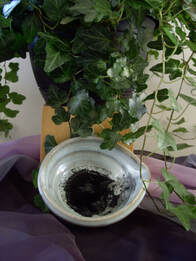 Cleanse out the old leaven that you may be a new lump, as you really are unleavened. For Christ, our paschal lamb, has been sacrificed. Let us, therefore, celebrate the festival, not with the old leaven, the leaven of malice and evil, but with the unleavened bread of sincerity and truth. -1 Corinthians 5: 7-8 Ash Wednesday has no holiday greeting. “Happy Ash Wednesday” sounds like a contradiction (since the word “happy” has traveled so far from its original meaning, “blessed” or “fortunate.” Instead, we recognize observance by the odd sign of ash smeared faces. An uptick in the number of people seeking imposition of ashes in parks and sidewalks (outside church enclosed worship) shows how important this non-verbal sign remains. We share a human need to pause and remember our humanity. Ash Wednesday is the entrance swinging open to Lent. Another trend in Lenten practice is to take on a new practice instead of fasting. To slow down, become more mindful, care for our bodies better, demonstrate purposeful compassion. These are all good practices. And the way we tend to them determines whether Lent becomes primarily a season of self-improvement or a season of shedding the sin that accrues to our everyday existence. But have you noticed how we seem to now talk more about self-improvement than the impact of evil? Maybe it’s the empowering knowledge that we can improve ourselves contrasted with the overwhelming challenge of confronting evil. That can only be done with God’s intervention. It means admitting our own vulnerability and incapacity to do it by our own ash-marked selves. “When we participate in the service of ashes, we confront our sin. We recognize our inability to live up to all God has created us to be, and our need to be forgiven…. On the first day of Lent, we come before God recognizing our humanity and repenting of our sin.” (Why Ashes? UMC.org) In the early days of Methodism, every circuit rider’s saddlebag held a copy of John Wesley’s “Primitive Physick,” written in 1791. This was Wesley’ best attempt to grapple with healing the effects of sin in our physical bodies. These are the opening words (in their original spelling when f=s except at the end of a word, and “man” was used for humankind). When man came firth out of the hands of the great Creator, clothed in body as well as in foul, with immortality and incorruption, there was no place for phyfic, or the art of healing. As he knew no fin, fo he knew no pain, no ficknefs, weaknefs, or bodily disorder.…The entire creation was a peace with man, fo long as man was at peace with his Creator. So that will might “the morning ftars fing together, and all the fons of God fhout for joy.” But fince man rebelled againft the Sovereign of heaven and earth, how entirely is the fcene changed! The incorruptible frame hath put on mortality. The feeds of weaknefs and pain, of ficknefs and death, are now lodged in our inmoft fubftance; whence a thousand diforders continually fpring….the earth exhales poifonous damps from beneath; the beafts of the field, the birds of the air, the fifhes of the fea, are in a flate of hoftility; the air itfelf that furrounds u son every fide, is replete with the fhats of death; yea, the food we eat, daily faps the foundation of the life which cannot be fuftained without it. So has the Lord of all fecurred the executin of his decree, ----Duft thou art, and unto duft thou fhalt return. Wesley goes on to prescribe exercise, temperance in food (“8 ounces of animal protein and 12 of vegetables in 24 hours is sufficient”)and drink (water if tolerable and, if not, small beer) and going to bed early. When these preventatives were not enough, the “Primitive Physick” prescribed remedies he’d seen people try, such as for a cold in the head, “Pare very thin the yellow rind of an orange. Roll it up infide out, and trhuft a roll into each nostril.” These attempts at healing were an attempt to undo sin’s consequences. Additionally, Wesley spoke out against “abuse of animals, the exploitation of poor people, and the treatment of human beings as chattel.” His early focus on social justice led to the Social Principles, a living document that describes how we follow Jesus Christ in “accepting the freedom and power God gives you to resist evil, injustice, and oppression in whatever forms they present themselves.” (baptism covenant). In 1908, The Methodist Episcopal Church, one of our predecessors, was the first denomination to adopt a Social Creed, which called for “equal rights and complete justice for all men in all stations of life.” The new 2020 Social Principles state our specific commitments, as United Methodists, to restore damage done and to shape communities whose norms stand up against evil’s insidious force. My friends, as we enter Lent this year, there is nothing wrong with fasting from something we love to experience longing that reminds us to turn to God. Fasting is a practice that reveals what controls us, writes, Richard Foster. So, give up your chocolate, or TV, or complaining if it turns you toward Jesus. But don’t settle for self-improvement. Let your encounter with the living Christ burn away signs of sin in your life. Let it cleanse you to be a sign of, and partner in, God’s healing of humanity and all creation. May lent 2020 be a space for grace within you and in the space you share with others. allow the lumps to become leaven! In God’s Grace, Karen Ash Wednesday is a particular time for new beginnings in faith, a time for returning to the Lord. On tis day we recall our mortality and wait upon the LORD for a renewing Spirit. This is a time for putting aside the sins and failures of the past in the light of who we are yet to become by the grace of God. -Larry Stookey, The New Handbook of the Christian Year, 1992, page 106. 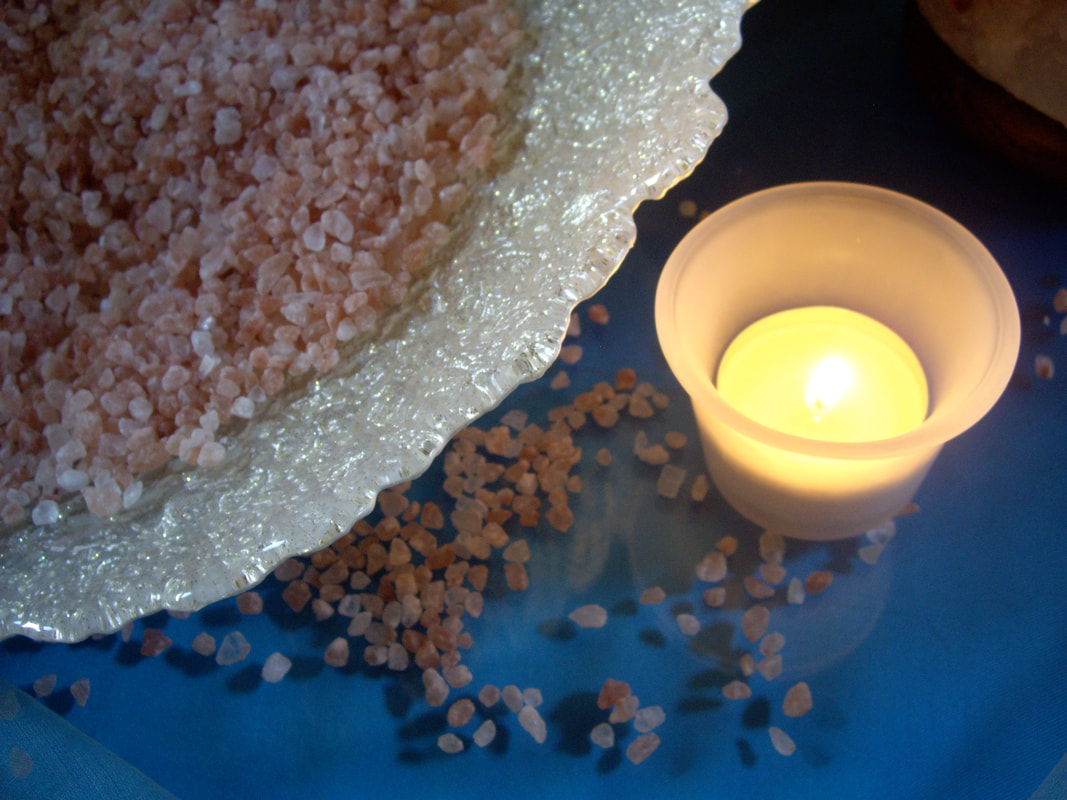 “You have heard that it was said, ‘You shall love your neighbor and hate your enemy.’ But I say to you, love your enemies and pray for those who persecute you, (Mt 5: 43-44 NRSV) I can’t remember the last time that words from scripture made headline news. This creates a wonderful opportunity to talk with other people about what this passage means to us and to them. I appreciate the honesty of people who name that it’s hard to follow Jesus’ instructions on this one. Truthfully, it’s hard to live into alot of the Sermon on the Mount, where these words are recorded. So, as people are talking about this year’s National Prayer breakfast, why not widen the conversation by asking them, and each other, how these words impact our own lives? What’s the word, idea, or situation that trips you up? How do these words empower us for a different way of being in the world? Do we respond by rejecting Jesus’ teaching as impossibly aspirational? Or by allowing God to turn us inside out and right side up? Jesus’ instruction to “love your enemy” comes at the end of Mathew chapter 5. The words immediately before are: Give to everyone who begs from you, and do not refuse anyone who wants to borrow from you. (Mt 5: 42 NRSV) (See, the teachings are not getting any easier!) And right after “love your enemy” we read,….so that you may be children of your Father in heaven; for he makes his sun rise on the evil and on the good, and sends rain on the righteous and on the unrighteous. For if you love those who love you, what reward do you have? Do not even the tax collectors do the same? And if you greet only your brothers and sisters, what more are you doing than others? Do not even the Gentiles do the same? Be perfect, therefore, as your heavenly Father is perfect. (Mt 5: 45-48 NRSV) What’s the word, idea, or situation that trips you up? Personally, I really have trouble with the word “enemy.” I realize that’s partly due to my privileged status in the world and partly due to my childhood role models of bridging differences and cultivating compassion. So I need to think about what "enemy" means, and about what "love." Who do I find it difficult to behave lovingly toward? Jesus' words indicate that it more important to overcome the aversion than to figure out why I find that person hard to "love." How do these words empower us for a different way of being in the world? The first metaphor in the Sermon on the Mount is salt. When Jesus asks us to be salty people, he doesn’t mean provocative language. I encourage you to do things this week. First, instead of adding fuel to the fire around “love your enemies” as a political situation, treat it as a conversation opportunity. Second, read all of Matthew 5. How do we wrestle with the difficult teachings we find there? What questions are raised that may help us go deeper into Jesus’ teaching? Who might it be helpful for you to talk with about your own questions and struggles? When we name that something is hard, we come to a fork in the road. We can either brush it off as impossible or irrelevant. OR we can wrestle with the difficulty with what it really means to follow Jesus. That’s what moves us from “you’ve heard it said,” (did you hear what so and so said) to a transformative way of loving and living. In God’s Grace, Karen God asks us to keep an eye on the big picture at the same time that we live accountably via small choices. For example, while next month’s clergy pre-Lenten gathering will create soul space for re-centering in God’s wider presence and purpose, our meal will be curated to reduce the MidMaine District’s carbon footprint (in addition to being Simply Susie’s delicious catering). In a recent bag of food-I-shouldn’t-eat-if-I-want-to-get-my-weight-down, these two apparently competing fortunes broke out of their cookies. (Yes, I ate both cookies).
If it ain’t broke, don’t fix it. About time I got out of that cookie. These two contrasting witticisms sum up stuff all of us in the world are trying to figure out. What ISN’T broken and shouldn’t be thrown out like the baby and the bathwater? (Sorry, new metaphor). What IS broken and how might it be fixed? What cookie are we are stuck in and how do we break out to find breathing room? This week in worship, many of us will read familiar words, maybe too familiar. He has told you, O mortal, what is good; and what does the LORD require of you but to do justice, and to love kindness, and to walk humbly with your God? -Micah 6:8 And When Jesus saw the crowds, he went up the mountain; and after he sat down, his disciples came to him. Then he began to speak, and taught them, saying: "Blessed are the poor in spirit, for theirs is the kingdom of heaven. "Blessed are those who mourn, for they will be comforted. "Blessed are the meek, for they will inherit the earth. "Blessed are those who hunger and thirst for righteousness, for they will be filled. "Blessed are the merciful, for they will receive mercy. "Blessed are the pure in heart, for they will see God. "Blessed are the peacemakers, for they will be called children of God. "Blessed are those who are persecuted for righteousness' sake, for theirs is the kingdom of heaven. "Blessed are you when people revile you and persecute you and utter all kinds of evil against you falsely on my account. Rejoice and be glad, for your reward is great in heaven, for in the same way they persecuted the prophets who were before you. -Matthew 5:1-12 When words become familiar, our comfort level scan create husks that shelter us from the speaker’s true intent. Saying the words “right” (comfortably) becomes more important than letting the speaker’s voice break our soul space open. But for Christians, both our lifestyle and our identity are meant to be shaped by these simple words, so familiar that we are in danger of ignoring their muscular power. These are not just instructions (build-a disciple?). These are not a “to-do list.” With these sacred words, first the Prophet Micah and later Jesus himself work on us as bakers kneading yeast into bread or a potter at the wheel-pushing, pulling, forming us as God loving disciples. The baker has ripped the lovely little yeast bag open to release its contents into the batter. The potter has broken up old pots, crushed them down to their essence, and revived the clay. These words are not just words. They are the shape of God’s own hands, pushing and pulling us into alternate community, enlivened by Christ’s presence. 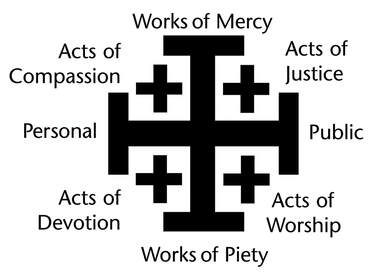 In a sermon shared with clergy colleagues last week I spoke of how powerful it is to look back and name what God has helped us to do and become. Effective non -profits and businesses do this well. Here’s an example from North Carolina that might get us thinking about how to assess and communicate something similar in our churches. At the close of one year and the start of another many personal inventories are offered to us. This year seems to be amplified by the turn in decades! We can take stock of what fills our homes, of our work goals, of our relationships, of our health. John Wesley’s “means of grace” offers an inventory of our journey with Jesus. How engaged are we? What discipleship practices were most meaningful last decade? What practices might God be calling us to renew now? (And is your relationship with God through Christ as important to you as other aspects of your life?) *Prayer *Bible reading *Fasting *Holy Communion *Christian Conferencing *Worship *Devotional time *Acts of compassion, justice, and mercy Just like an exercise program, growth only happens when we actually put into action what we have been thinking about. I don’t know about you, but I find that much more compelling when I have partners. I pray more often when I know someone is going to ask, “how was your prayer life this week?” I follow through with fasting when I’m in purposeful covenant with others. I encounter the depth and nuances of scripture more deeply in conversation with others as well as on my own. It can be tempting to get distracted or to push pause when uncertainties loom. Wesley reminded the Christians of his day, as Jesus did in his, that the time to recognize God’s transforming presence is now. We do not wait for perfect structures or outcomes. My prayer for each and all of us is that in a new decade our practices would grow in intention, partnership and power. In God’s Grace, Karen P.S. For a good introduction to Wesley’s means of grace, try Elaine Heath’s little book, “Five Means of Grace: Experiencing God’s Love the Wesleyan Way.” Even better, read it with a friend. But be glad and rejoice forever in what I am creating;
for I am about to create Jerusalem as a joy, and its people as a delight. I will rejoice in Jerusalem, and delight in my people; no more shall the sound of weeping be heard in it, or the cry of distress. -Isaiah 65: 18-19 Last Sunday I had the opportunity to preach. (Thank you, Rev. Elizabeth Bachelder Smith for the invitation into your pulpit). It felt so good! It was where I needed to be, doing what I need to do. I hope that if you are a preacher, you love preaching (almost) every Sunday. I hope that if you extend the hand of Christ in a food, or clothing, or teaching, or singing, or wood chopping, or photocopying, or praying with, or any other kind of ministry, you truly love what you are doing. I’m not taking about a superficial happy face that grins and bears it. I’m talking about a deep connection with the purpose God has given you as your special gift. Lisbon UMC’s leaders reminded me of this as they described finding their fire delightfully reignited. Their Discovering the Possibilities team is intentionally opening their hearts in spiritual formation and their doors in deeper community engagement. Opening the doors doesn’t only mean inviting people in. It also means inviting church members to venture out in purposeful ways. Have you ever looked at a painting of Jesus knocking at the door and wondered whether he was asking to be let in or whether he was asking us to come out? False humility can mask the delight we find in the work to which Christ invites us. “Ah, I’m just doing what I otta,” is hardly a delight-full response to someone noticing that we are doing good work. What difference might it make if, when someone notices what we’re up to, we said something like, “it just makes me so happy that God gave me this work.” The thing about doing God’s work is that the harder it gets, the more the light can shine through us. And to people wondering whether God will ever get them through what they’re going through, the prophet says that God designs us for work that is ultimately full of delight, the hallmark of kin-dom living. They shall build houses and inhabit them; they shall plant vineyards and eat their fruit. They shall not build and another inhabit; they shall not plant and another eat; for like the days of a tree shall the days of my people be, and my chosen shall long enjoy the work of their hands. They shall not labor in vain, or bear children for calamity; for they shall be offspring blessed by the LORD-- and their descendants as well. Before they call I will answer, while they are yet speaking I will hear. The wolf and the lamb shall feed together, the lion shall eat straw like the ox; but the serpent--its food shall be dust! They shall not hurt or destroy on all my holy mountain, says the LORD. -Isaiah 65:21-25 PS Want to know the secret of the Lisbon team’s energizing experience? Each meeting opens with shared prayer, moves into the bible for open listening, shares the wisdom of an author, then asks what does God have for us to do and how shall we go about doing it? So simple, so transforming, so Wesleyan! Be ye transformed…….. 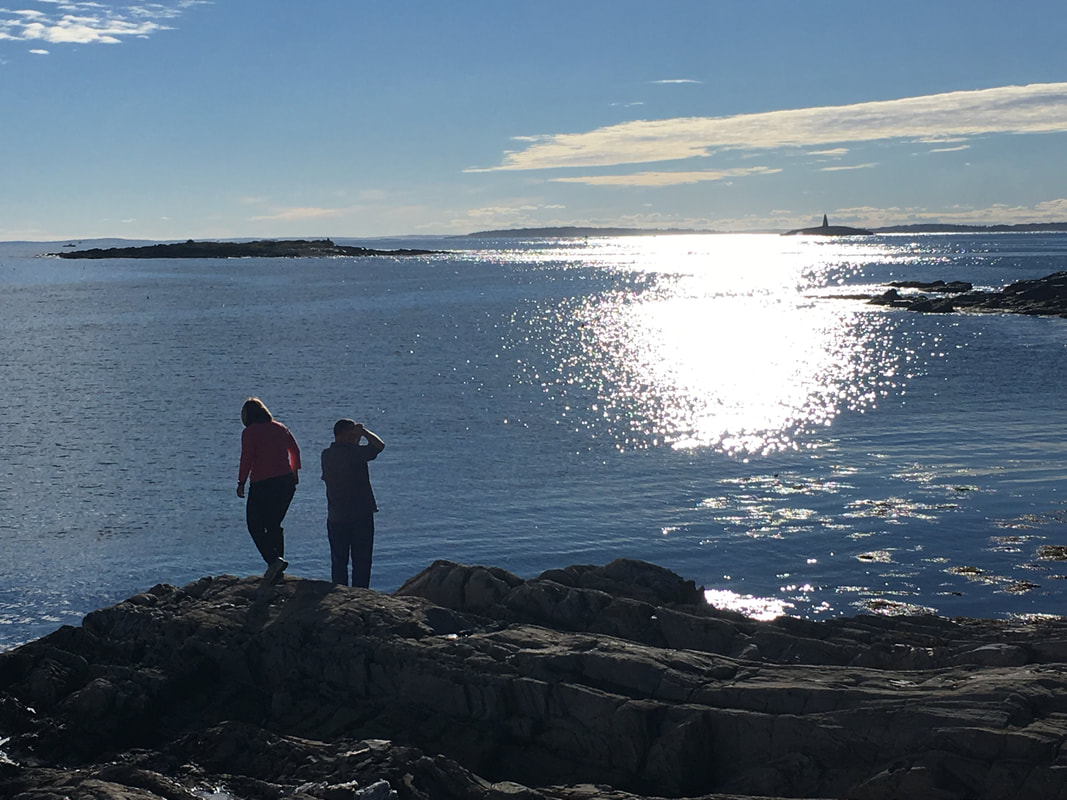 Many of us grew up being told (or telling ourselves) to be good and do well. In other words, learning to follow the rules and achieving admirable goals. Psalm 108starts out there but then heads in another direction. Will you look through it line by line with me? My heart is steadfast, O God, my heart is steadfast. The singer begins his/her morning by declaring their position, “I am steadfast.” I can imagine someone swinging their legs out of bed with resolve for a new day of challenges. They tell God that they are ready. I will sing and make melody. Here’s the first work of the day. Awake, my soul! And here’s the personal pep talk! Awake O harp and lyre! Get your tools in gear! I will awake the dawn. Now awake, he/she feels empowered to impact all of creation. It’s like a yoga power pose. This song will rock the world. And in that moment of empowerment, the singer’s attention refocuses. He/she is greeting the dawn, but not the creator of it. I will give thanks to you, O Lord, among the peoples And I will sing praises to you among the nations. Not only is he/she not in charge of the world but, as they continue to awaken, they see that they are not alone. In their empowerment they are surrounded by others of God’s making. For your steadfast love is higher than the heavens And your faithfulness reaches to the clouds The awestruck singer’s mind opens wider, their hands and heart reach higher-up, up up, out, out out. It is a stretch that brings new power to his/her body and soul. God is good! It is God’s steadfastness that grounds my own attempt to stand on these two feet, to wheel my chair, to dance each day’s dance. For your steadfast love is higher than the heavens, And your faithfulness reaches to the clouds. My creator’s love is impossibly expansive, more than I can imagine, and yet still it holds me. Be exalted, O God, above the heavens, And let your glory be over all the earth. I lose myself in God’s glory. And still I am found, here in God’s earth-creation singing, searching, shouting, crying. Give victory with your right hand, and answer me, So that those whom you love may be rescued. The “so that” pierces my heart every time. My imagination can only begin to grasp the day he/she faced. The original singer of Psalm 108 lived in a disparate time of international conflict. Verses continue to flow, now describing the battles that are the singers' work, full of moments of achievement and frustration. It ends with a reminder that completion of the work is in God’s own hands not the singer’s. This past summer, I read this psalm 64 times with pastors during our annual conversations. It became a rhythmic soul exercise. As I prepare to post these thoughts now the sun is coming out over a rain-swelled pond. Light glints on the surface. A loon is joining the song. I am not alone. I am awake. I am finding my voice. I am in community. I will face challenges in a post 9-11 world. I have a purpose that is not only my own but part of God’s own. The Christ desires that we be well and do good. The living Spirit breathes that possibility into us each day. Good (God’s) Morning! With God we shall do valiantly. 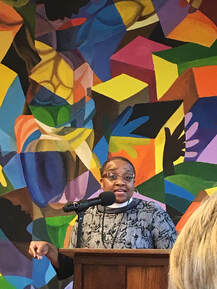 Naomi Tutu shares Ubuntu with 2019 Theology & Peace participants Naomi Tutu shares Ubuntu with 2019 Theology & Peace participants I almost didn’t go. There’s just so much on my to-do list, so much to follow up on after Annual Conference, so much to prepare for a new appointment year, so many beloved people (family, friends, churches, organizations) needing something. It felt selfish. But it also felt necessary. I went to step out of the steady stream of joyous and productive business. I went to renew an old acquaintance with Rev. Naomi Tutu. I went to meet Fr. James Allison, a biblical theologian who’s gifted me with new insights. I went to refresh my theological perspective. Leaving for the Theology and Peace Conference in Nashville, immediately after Annual Conference, meant trusting that God would provide, hold, tend to all those things that almost kept me from going to what turned out to be the richest continuing education experience I’ve had in years. Maybe the harder it is to walk away for a while, the more we really need it. Isn’t that the point of Sabbath? Even when we absolutely love the work we do, we need to practice letting it be God’s, and letting ourselves be God’s. This means personal sabbath and it also means putting down our work for a while when we are called to come together for Annual Conference, Ministry Day, or covenant group time. If we don’t prioritize these in our planning we are essentially saying to God, my work is more important than yours. It can also be hard to step away when we are reluctant to embrace what we are called too. I almost didn't go because I know Nashville is hot and humid in the summer. But my anticipation of "the worst" was more than overcome by my experience of "the best." This summer, I find myself wondering what it would be like for all of Methodism to be in Sabbath? In the exhausting work of ministry and of transformation, could we simply rest together for a while as community in the presence of God? I know from the renewal I feel coming back from Nashville that laying it down renews us for picking it back up again (or for leaving some things rest so that new things may begin). It’s a great joy to see how many of our churches are active this summer, worshipping, playing, and resting together. (23% of our MidMaine churches increased worship attendance in 2018 due to their increasing community engagement.) May God bless your coming and your going, your work and your rest in this delightful gift of a season in Maine! 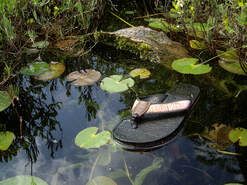 Walking on Water at Torsey Pond Walking on Water at Torsey Pond "It is done! I am the Alpha and the Omega, the beginning and the end. To the thirsty I will give water as a gift from the spring of the water of life. -Revelation 21: 6 The small and mighty choir loved singing heartfelt gospel songs, especially ones they’d known for years. Their new director did too but wanted to stretch their musical horizon. So, he set them to work on “Alpha and Omega” by the Gaithers, with its tempo changes and challenging harmonies. (In the interest of full transparency, the director was my husband and the choir at Readfield UMC, my first appointment as a United Methodist Church pastor.) For weeks (seemed like years) we made mistakes and moaned. He helped us conquer that piece phrase by phrase until it entered our very selves and we could toss it around with skill and delight. Sometimes discipleship, progress into God’s vision, is like that. I have heard that wonderful little band of brothers and sisters singing in my memory over the past few months and here, this week, comes the passage, Revelation 21: 1-6: Then I saw a new heaven and a new earth; for the first heaven and the first earth had passed away, and the sea was no more.And I saw the holy city, the new Jerusalem, coming down out of heaven from God, prepared as a bride adorned for her husband. And I heard a loud voice from the throne saying, "See, the home of God is among mortals. He will dwell with them as their God; they will be his peoples, and God himself will be with them; he will wipe every tear from their eyes. Death will be no more; mourning and crying and pain will be no more, for the first things have passed away." And the one who was seated on the throne said, "See, I am making all things new." Also, he said, "Write this, for these words are trustworthy and true."Then he said to me, "It is done! I am the Alpha and the Omega, the beginning and the end. To the thirsty I will give water as a gift from the spring of the water of life. I still can’t listen to “Alpha and Omega,” the song, without parts of my body starting to move. From the very first piano notes the hairs on my head stand up and take notice. And I can’t read “Alpha and Omega,” the scripture, without the song erupting in full voice in my mind. (Very distracting when you’re trying to write an article….) I think that our best ministry moments as disciples of Christ (laity, certified, licensed, ordained) resonate like that. We yearn and practice to be more like Jesus, to step to the odd rhythms of faith-filled-living and then, when we least expect it, it all comes together and our souls soar. Everything aligns with a harmony only God could create. And then we find ourselves faced with a new “piece” to learn, even while the one we’ve come to know and love feels like a place we’d like to stay a little longer. (Remember Peter’s test offer to Jesus on the mountain?). And the one who was seated on the throne said, "See, I am making all things new." What does flourishing ministry look like, act like, in the new and changing reality we where we find ourselves? What does flourishing as a disciple of Jesus Christ feel like as we practice toward the new reality God promises? We live in a time when the multiple realities of past, present, future, and realm of God seem to be in incredible tension. Last fall I attended an event that brought together pastors serving in cross cultural contexts. Louisiana Area Bishop Cynthia Fierro Harvey said, “This room is what I think heaven must look like — and I didn’t have to die to see it.” But in that space, around conference tables, frustrations were shared. A Korean pastor was criticized by a member of the congregation for “mispronouncing” words with his accent. A black female pastor dealt with white churchgoers touching her long, dreadlocked hair without invitation. An African-American pastor was met with hostility by his wealthy, suburban church after speaking out against the wave of police shootings involving black men because “that doesn’t happen here, so it’s not our problem.” One Latina pastor serving cross culturally becameknown as “the angry pastor” when she tried to defend herself and push the church into deeper understanding of difference. But sheacknowledged that the cultural divide works both ways. “I underestimated the power of my own biases. I didn’t love that church as they were, unconditionally,” she said. “…… Micro aggressions require us to respond with macro grace.” And I heard a loud voice from the throne saying, "See, the home of God is among mortals. He will dwell with them as their God; they will be his peoples, and God himself will be with them; he will wipe every tear from their eyes. Death will be no more; mourning and crying and pain will be no more, for the first things have passed away." Sometimes we try to protect the little piece of “heaven on earth,” what we’ve known so fiercely that God’s still developing melody has trouble being heard. "See, I am making all things new." I love that little song I learned so laboriously back in the day. But even more than the song, I love the way it taught me to persist toward the vision, especially when it got uncomfortable and I wanted to walk away. That was when laughter erupted in our choir practice and washed us with the joy of being human together. The kingdom of God is like sheer delight, like walking on water. Then I saw a new heaven and a new earth; for the first heaven and the first earth had passed away, and the sea was no more.And I saw the holy city, the new Jerusalem, coming down out of heaven from God, prepared as a bride adorned for her husband. In God’s Grace, Karen |
Karen L MunsonA pastor and artist, I'm wondering while I'm wandering through God's marvelous creation. Archives
March 2020
Categories |
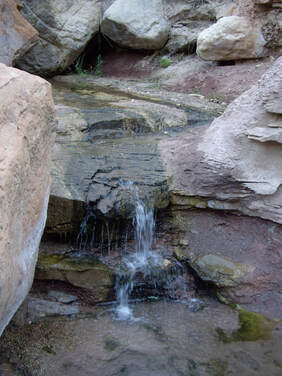
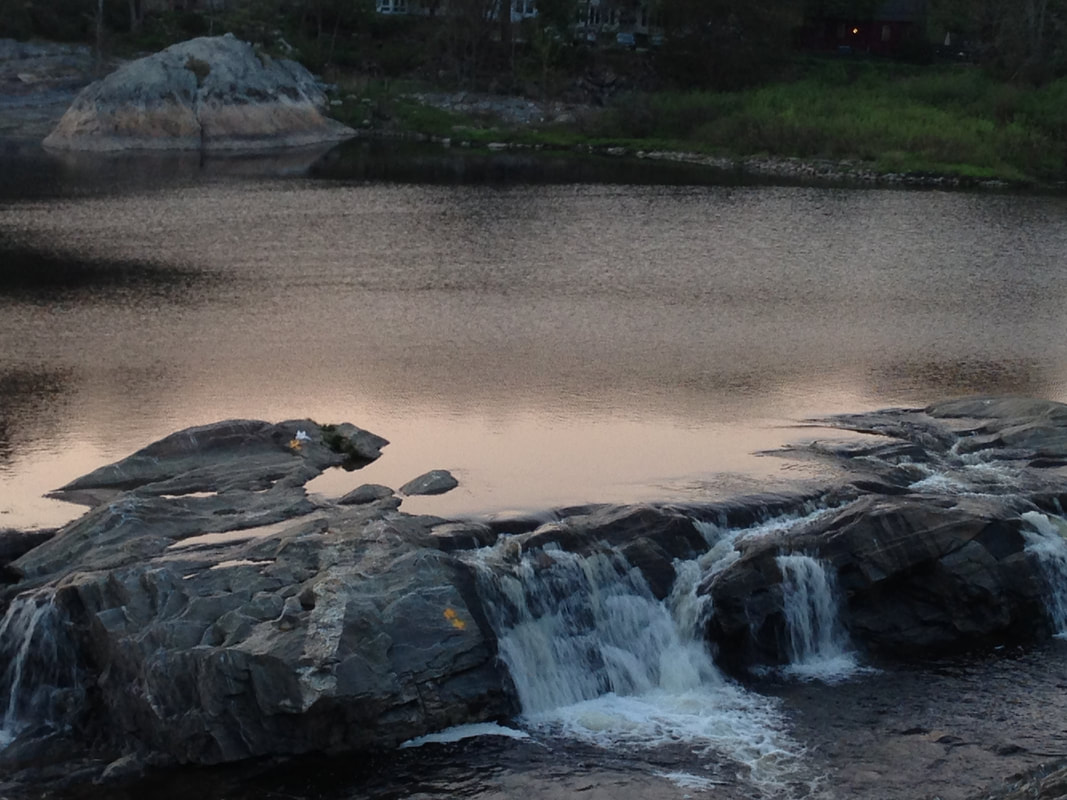
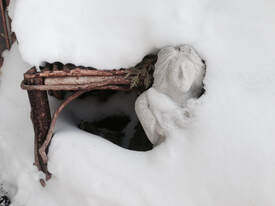
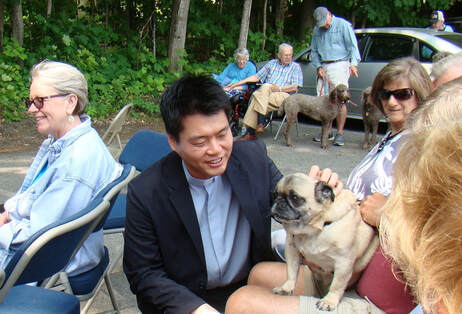
 RSS Feed
RSS Feed